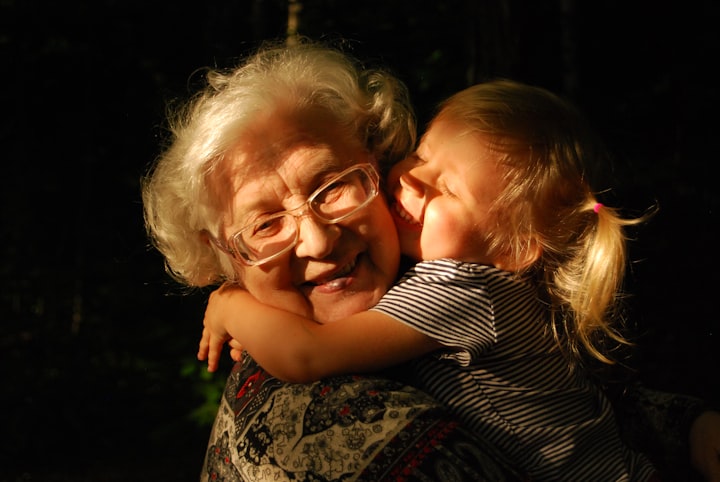Delight in Old Family Traditions While Creating Authentic New Ones
Traditions are adaptable to our current lives

The distinct, spicy aroma of cloves brings me back to holidays with my mom. When I was young, probably elementary-school-aged, she’d hand me a spice bottle full of whole cloves and a couple of oranges. My task was to poke as many cloves as would fit in the oranges. Contentedly, I'd lick the sticky juice from my fingers and inhale the scent of Christmas.
Mom set the clove-poked oranges out as room fresheners and decorations. They lasted for weeks before shriveling into dried-out shrunken oranges.
I loved that activity with mom.
***
Do you have holiday family traditions similar embedded in your being? Did you go skiing every winter break? Did you take a walk with your big brother to the neighborhood park on Wednesday afternoons? Did your dad weave original bedtime stories with holiday flair just for you? Did you and your mom embark on autumn leaf walks? Did you bake holiday cookies with your grandma, grandpa, aunt, uncle, or another family member?
What traditions make you you?
***
Traditions give us a break from our fast-paced lives
In the high-paced 21st century, traditions grant us permission to slow down. Societally, we are granted permission to be with our friends and loved ones while taking much-needed breaks from work, school, running the home — whatever keeps us go, go, going, gone.
Traditions are a steadfast way to create cherished memories and meditate on the passage of time in our lives.
Dr. Saul Levine breaks down the importance of traditions in his Psychology Today article “A Profound Need For Our Traditions.” He asserts that traditions give us a moment to let go of the stress of our whirlwind lives:
When traditions take place on a regular basis, they bring predictability and constancy to our lives. In addition to the nurturance and pleasure of communing, they help remove us, at least temporarily, from the cacophony of the outside world. We get reassurance that we will indeed be all right.
Traditions are signals for us to stop and rest, to take stock of our lives, family and friends. They give us permission to pause and enjoy ourselves. We think about the past and future since there’s a point of comparison when celebrating traditions from one year to the next.
Enjoy this time of reflection.
***
Creating new traditions out of the old
When I was a little girl, after my parents’ divorce, I celebrated the Eight Days of Hannukah with my dad and opened stockings and Christmas presents with my mom. Looking back, there were a few traditions in my childhood that I came to cherish.
On Christmas morning, I’d open my stocking in front of my mom. I knew there’d always be oranges and walnuts sitting in the toe — a tradition passed on from her family. Although I remember this tradition fondly, our kids don’t care for it, and it’s long been retired.
Mom and I would drive around town one evening around Christmastime and gaze in wonder at the twinkling lights decorating people’s homes. We were joyful as we went on this light tour. This is another activity our kids — and my husband — don’t much care for. That’s okay. Every once in a while, I request a drive around town to look at the shining, glistening Christmas lights displays, and they oblige, but I don’t push it every year.
As our little family has evolved, we've chosen to honor some old family traditions while creating new traditions of our own.
At some point, when our kids were smaller, I realized that I’m not one for focusing on decorating. I didn’t think much about honoring old traditions or creating new ones. I liked it when they were created for me though.
I felt a kind of sadness and longing for incorporating traditions into our family. Once I realized what I was missing, I decided to make an effort to create traditions that work for our family, with our family. I decided to involve the kids. That was a great choice because the traditions I loved are not traditions they love.
Cooking has become a central tradition in our family. David concocts amazing Thanksgiving food. Ceci makes Christmas cookies. We decorate them together. Our home is draped with decorations for Halloween, Fall, Hannukah, Christmas, and New Year’s. We do something on the 4th of July — even if it’s just setting off smoke bombs in our yard.
***
Traditions gently mark the passage of time
At my botanic garden job, so many tasks marked the passage of time: tulip bulbs delivery, holiday lights sorting and decorating, tulip bulbs planting, planning for seasonal displays, running the holiday festival, fall and winter pruning, annual plantings in spring, upkeep in the heat of summer, and then starting the cycle all over again.
Now that I’m working from home, these markers of time are no longer in my life, and although I notice the subtle changes in the seasons, I don’t notice them as much as when I worked outside most of the week.
***
The four B’s of traditions
According to Dr. Levine, there are four essential elements that create the foundation of all traditions, “our senses of Being, Belonging, Believing, and Benevolence.”
Being
Being refers to appreciating ourselves and our strengths, and feeling grounded in our core identity in spite of our frailties and foibles.
This rings true to me. Taking the time to create the clove-adorned oranges gives me a chance to be still and reflective. Our identity is often related to the traditions we celebrate month-to-month and year-to-year.
Belonging
Belonging refers to our personal comfort in knowing that we’re an integral part of some group(s), where we are respected and appreciated, perhaps loved by others.
Knowing we will spend the holidays with each other helps bring a sense of belonging. Even though our social interactions are limited in 2021, we are still spending time with our nuclear family or perhaps a few close friends or extended family. Maybe you have the best-decorated home for Halloween or Christmas or the specific holidays you celebrate. Maybe you’re famous for a holiday dessert or casserole. It feels good to be acknowledged and appreciated for these contributions.
Believing
Believing means that we have a set of “higher” (ie, non-material) principles and values by which we lead our lives, which can be religious or secular rules of ethical behavior.
Although I’m not religious, I consider myself highly ethical and moral. Friendships and family relationships are important to me. There’s an emphasis in our family on the importance of being together. I have a spiritual affinity with all things nature.
I have traditions that help me remember my tie to the earth and a universal spirit greater than myself. I plant garlic between the autumn equinox and winter solstice. I plant potatoes between Valentine’s and St. Patrick’s Day. These are points in time when I reflect and commune with nature — they’re my personal traditions.
Benevolence
Benevolence refers to the extent to which we enhance the lives of others — be they family, friends, or strangers — and leave a “Positive Emotional Footprint.”
Gathering to celebrate birthdays, anniversaries, and other celebrations is a way of honoring the people in our lives. I don’t normally enjoy being the center of attention but I requested a 40th birthday party and David planned a fantastic soiree. Friends and family came to celebrate this special passage of time. I was able to witness in a concrete way the “positive emotional footprint” others have on my life and that I have on the lives of others. Instead of being down in the dumps about being over the hill, I was uplifted.
***
Keeping Traditions Ignited
As we wind through the challenges of the year and beyond, I believe it’s more important than ever to keep traditions alive. They may need modifications and you are the perfect person to give old traditions a new twist. Don’t be afraid to adjust them to fit your lifestyle. This is a great year to create new traditions and innovate on favorites of years past.
Through honoring and celebrating traditions, we notice one year changing into the next year — we become more acutely aware of the passing of time.
There’s a sadness knowing so much time has elapsed. There’s also wisdom in cherishing what we do have when we have it.
Traditions are our roots and a profile of who we are as individuals and who we are as a family. They are our roots, which give us stability and a sense of belonging — they ground us. Lidia Bastianich
Take a moment to reflect on your life’s traditions.
- What do you want to keep?
- What is it time to let go of?
- Which traditions make you you?
If you feel a little stumped on creating your own traditions, try listening to this short podcast for inspiration: The Lazy Genius Collective. You can also find inspiration from Parks and Rec’s Galentine’s Day, Seinfeld’s Festivus, and Friendsgiving — an early 2000s spinoff on Thanksgiving.
Hold on to your traditions — love them, and keep their flicker alive for yourself, your family, and your friends.
Embrace new traditions with your family. Cull what needs to go and incorporate new riffs on old activities.
Cheers to traditions, old and new.
About the Creator
Aimee Gramblin
Lifelong storyteller, bone marrow made of words, connection, heart, and all the other sciency stuff. Poet, Essayist, Dreamer.






Comments
There are no comments for this story
Be the first to respond and start the conversation.